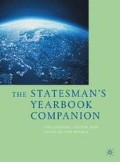You have full access to this open access chapter, Download reference work entry PDF
Introduction
Maria Corazon (Cory) Conjuangco Aquino is attributed with restoring democracy in the Philippines. She was the country’s first female president (1986–92). The wife of murdered dissident Benigno Aquino, she defeated Ferdinand Marcos after disputed elections.
Early Life
Corazon Aquino was born on 25 Jan. 1933 in Tarlac province, Luzon. After studying in Manila, Aquino left the Philippines with her family for the United States where she finished her education at Mt Saint Vincent College in New York, graduating with a degree in French and mathematics.
After returning to the Philippines to resume her academic career she met and married the politician, Benigno Aquino Jr. in 1954. Benigno Aquino, a Liberal party opponent to Ferdinand Marcos and ardent critic of Marcos’ ‘Oplan Sagitarius’—a plan to declare martial law in the capital. He was arrested in 1972 and exiled in 1980. Upon Benigno Aquino’s return to the Philippines in 1983 he was assassinated at Manila International Airport.
When, in 1986, President Marcos announced a surprise election the opposition to the Marcos regime unified behind Cory Aquino. Former Senator Salvador Laurel of the UNIDO Party stood down as presidential candidate to run as Aquino’s vice-presidential candidate.
Career Peak
After a bitterly contested election Marcos and Aquino each claimed victory. Both were inaugurated by their respective supporters. Marcos, after his being inaugurated at Malacañang Palace fled the country, leaving Aquino to take power.
On 25 March 1986 Aquino proclaimed a provisional constitution (the Freedom Constitution) and then appointed a commission to write a new constitution. This was ratified by referendum in Feb. 1987 and included the provision that the head of state is directly elected for a non-renewable 6-year term. Despite attempts to address government corruption, including long-established commercial monopolies, Aquino failed to implement fundamental economic change. Corruption remained endemic, support from the military wavered and communist groups were a constant threat. She was replaced in 1992 by her defence minister, Fidel Ramos. She died of cardio-respiratory arrest on 1 Aug. 2009, aged 76.
Copyright information
© 2019 Springer Nature Limited
About this entry
Cite this entry
(2019). Aquino, Corazon (Philippines). In: The Statesman’s Yearbook Companion. Palgrave Macmillan, London. https://doi.org/10.1057/978-1-349-95839-9_40
Download citation
DOI: https://doi.org/10.1057/978-1-349-95839-9_40
Published:
Publisher Name: Palgrave Macmillan, London
Print ISBN: 978-1-349-95838-2
Online ISBN: 978-1-349-95839-9
eBook Packages: Political Science and International StudiesReference Module Humanities and Social SciencesReference Module Business, Economics and Social Sciences

